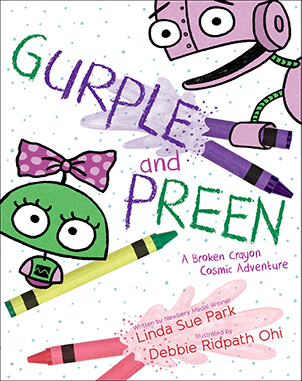Great advice for young readers from Jody Jensen Shaffer, author of PRUDENCE, THE PART-TIME COW about writing

Jody Jensen Shaffer writes books and poetry for children. Her award-winning poems have appeared in magazines like Ladybug, Babybug, Highlights, High Five, Clubhouse Jr., and more. Jody writes from her home in Liberty, Missouri, which she shares with her husband, two children, and their rescue dog, Sophie.
You can find more info about Jody at her website, on Twitter and her blog.
Her newest book is PRUDENCE, THE PART-TIME COW, illustrated by Stephanie Laberis and launches from Henry Holt/Macmillan *today*. Such a fun story; I love the idea of a cow with a thirst for knowledge. Plus I love the vivid colour palette and energy-filled laugh-aloud illustrations throughout! So much for young readers to point out and discuss.
Synopsis:
"Prudence looks like a full-time cow—she wanders through pastures, she swats flies, and she lines up for supper. But Prudence is really a part-time cow, because she’s also a scientist, an architect, and an inventor, studying and building and dreaming and creating. To the other cows in the herd, Prudence is a bit too part-time. At first Prudence tries to fit in, suppressing all her scientific smarts and imaginative inventing. But in a moment of inspiration—Cow Power!—Prudence realizes how she can be a part-time cow and a full-time member of the herd. Funny and sweet, this is a story for anyone who's ever felt a bit different."
I asked Jody if she had any advice for young writers. Here is her answer:
JODY JENSEN SHAFFER'S ADVICE FOR YOUNG WRITERS
My advice for young writers is twofold: believe in your Story Idea, and put in the effort to make your Story Idea work. What does that mean? Let’s take it from the top.
Believe in Your Story Idea
Every story, every book, every poem starts with an idea. It may be just a crumb of a thing to begin with—a word, a phrase, an image—but you can tell it has promise. So you play with it, you toss it in the air, you tease it mercilessly, until finally you corral a beautiful, wild thing that didn’t exist before: your totally-you, totally-unique Story Idea. What a concept! What a cast of characters! What a bright, shiny thing you’ve come up with! Your stomach flips when you think about it. You begin imagining what your Story Idea will look like when it’s finished, the accolades it will receive, what you’ll say when you accept the awards it’s sure to receive. And all from your humble, little idea!
 Jody's idea notebooks.
Jody's idea notebooks.
Then Ms. Smith asks the class to share their Story Ideas, and you discover—Egad!—that every single person in your class has come up with the same one! Your jaw hits your desk. How can that be? You were sure you and your Story Idea felt the same about each other. You stumble into your school library, stunned from the experience and hoping to find comfort in something you might find there. And that’s when you discover that nearly every book you pick up also uses your Story Idea! Not only is your totally-you, totally-unique Story Idea not unique, it hasn’t been unique for some years! Oh, the pain! The heartache! The soul-searching you’ll now do!
 Jody's home office.
Jody's home office.
Will you ever come up with a really good, really unique Story Idea?
Take heart, fellow writer. Here is some comfort: what you and your Story Idea have together is unique. It is different than all the others in your class and in your library, if you look closely. Here’s why. You are the only one who can take your Story Idea and develop it in a way that makes it unique, because you are the only you in the entire universe! Your experiences, your likes and dislikes, you family background, your word, plot, setting, and dialogue choices all influence what you make of your Story Idea, so it’s impossible for anyone else to take your Story Idea away from you! (And truthfully, it’s not about the Story Idea, anyway. Ideas are cheap. It’s the execution that matters. It’s what you do with your Story Idea, and only you bring your experiences and background to that task.)
Whew. Feel better? Good. Now let me tell you my second piece of advice.

Put in the Effort to Make Your Story Idea Work
You’ve now passed through the Valley of Story Idea Doubt, and you’re preparing to climb Mt. Writing Mountain. Above you is your goal, The End Summit. All that stands between you and the summit is…hard work.
“Ugh,” you say. “I thought writing was supposed to be fun!”
It is! But it is also work (I find that the two go hand-in-hand. The harder I work, the more fun I have and the luckier I become). What does “work” mean for a writer? It means treating your characters as individuals, making sure they don’t all think, act, and say the same things. It means putting obstacles in your characters’ paths, ones they’ll have to struggle to get past.
Work for a writer means being clever and funny and silly and unexpected and specific, and knowing when not to be. It means reading books, books like yours and books that are totally the opposite. It means asking for honest feedback (having a mentor is nice) and sincerely evaluating it, even if it comes from those who are behind you on their writing climbs.
It means being willing to change things, even your favorite parts, maybe the whole thing, and knowing when not to. Work for a writer means making your story better, draft by draft, word by word, and not thinking you’re done the first time.
Work for a writer means reading and writing regularly—almost anything will do—so you can get better. It means analyzing what works and what doesn’t in what you read and write. And eventually, when you’ve got your Story Idea all gussied up, work means sharing it with the world, come what may.
You’ll be proud of how far you and your Story Idea have come, and you’ll be excited to begin again with a new one.
~Jody Jensen Shaffer, June 2017
------
For more interviews, see my Inkygirl Interview Archive.














 Monday, June 12, 2017 at 2:33 PM
Monday, June 12, 2017 at 2:33 PM
Reader Comments